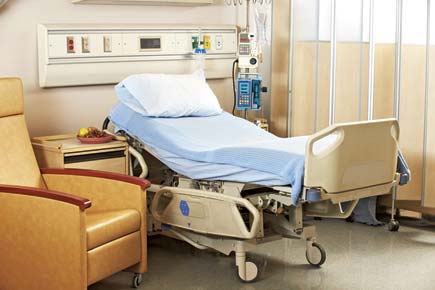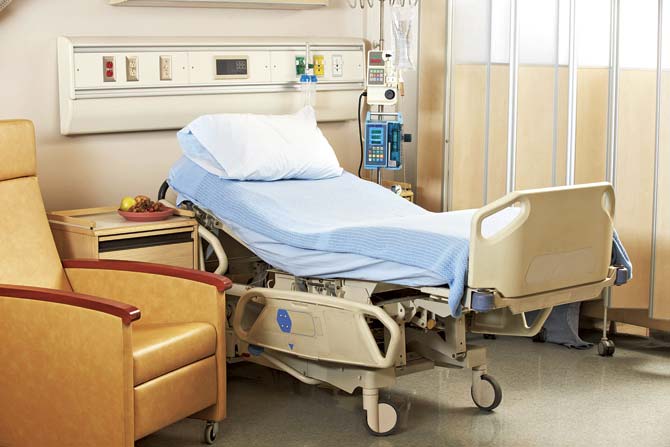Dealing with a few personal health issues, I’ve spent the last few months in and around hospitals in India

 Dealing with a few personal health issues, I’ve spent the last few months in and around hospitals in India. And the story everywhere is pointing to a dire future. Statistics from the National Health Mission tell us that we are desperately short of doctors, just 1,00,000 physicians to a population of 1.2 billion. The shortfall is most keenly felt in semi-urban and rural areas. But you don’t even need research to tell you that; empirical and anecdotal evidence will suffice.
Dealing with a few personal health issues, I’ve spent the last few months in and around hospitals in India. And the story everywhere is pointing to a dire future. Statistics from the National Health Mission tell us that we are desperately short of doctors, just 1,00,000 physicians to a population of 1.2 billion. The shortfall is most keenly felt in semi-urban and rural areas. But you don’t even need research to tell you that; empirical and anecdotal evidence will suffice.
A young woman who works as a cook in people’s homes goes into a well-known Mumbai hospital run by a charitable trust because she feels weak. She is immediately admitted and before her blood test results arrive, is given several anti-malarial injections. She does not have malaria as it turns out, and she is discharged two days later, Rs 11,000 poorer and with no idea what is wrong with her.
ADVERTISEMENT

The underprivileged have a fear of government hospitals in India and would rather go “private”. But that is often because they equate free with cheap, and cheap with bad quality. It’s no better at the other end of the spectrum where people go to corporate or private hospitals precisely because they are shiny and new and clean. Representation Pic/thinkstock
The underprivileged have a fear of government hospitals in India and would rather go “private”. But that is often because they equate free with cheap, and cheap with bad quality. The woman in the story however, having burnt her meagre wallet now prefers KEM, making the trek from the suburbs for more attentive medical care and less chance of being fleeced.
It’s no better at the other end of the spectrum where people go to corporate or private hospitals precisely because they are shiny and new and clean. But again, the young cook’s experience is replicated, this time in lakhs not thousands. We hear about doctors being given targets by hospitals, of tests being forced and bills being inflated. A friend did a random check on a detailed bill and was taken aback by the 100 rubber gloves that were slipped in. The stories of stents which cost thousands being priced at hundreds of thousands are now the stuff of urban legend. Everyone has their own version.
My own experience with Mumbai’s corporate and trust hospitals has been pleasant, with no horror stories. The surgeon was superb and the resident doctors, nursing staff and attendants friendly, efficient and helpful. The bill was large but not obnoxious. The insurance came through. Was I unbelievably lucky or is that the norm? I am sad to say that even I can’t be sure.
A visit to the Tata Memorial Hospital in Parel recently after a few years was even more gratifying. The dedication of the doctors there is remarkable, considering how much more they could make if they went private. The improvements made to the hospital, the new wings and the staff work hard to take the sting out of the demon that cancer can be.
In Uttarakhand, where I live, cancer treatment is in extreme short supply. An oncologist setting up his unit at a super-speciality hospital has found the government unresponsive to his suggestions and offers to help with treatment camps. The one hospital which offers full cancer treatments is inundated with patients from all over, somehow managing to cope.
As a society we’re being pushed towards the insurance model, which often encourages hospitals to up rates knowing that insurance companies are paying. But it is obvious that this cannot be the only answer. A country India’s size and with our social conditions has to invest more in public health. If hospitals like Tata Memorial, KEM and AIIMS, for instance, can do it, so can others.
Often doctors are blamed for this condition we’re in. But I have seen doctors battling the system and trying to go beyond their time and mandate to attempt to give their patients better health care. Yes, there are those who are only in it for the money or the publicity but they are not the bulk. Somehow, the juggernaut of healthcare seems to have overtaken them as well as us.
We cannot kid ourselves either. Good medical health means spending big money. Technology is an integral part of medicine and machines are expensive. Someone has to pay. Those who can afford it, will. But what about those who can’t? Are they to be denied medical help?
A very well-respected doctor and a friend said to me that it is becoming almost impossible to practice medicine ethically in India and live a life with some material comfort. If we want to have that better future, it’s time to take that as a wake-up call.
Ranjona Banerji is a senior journalist. You can follow her on twitter @ranjona
 Subscribe today by clicking the link and stay updated with the latest news!" Click here!
Subscribe today by clicking the link and stay updated with the latest news!" Click here!







